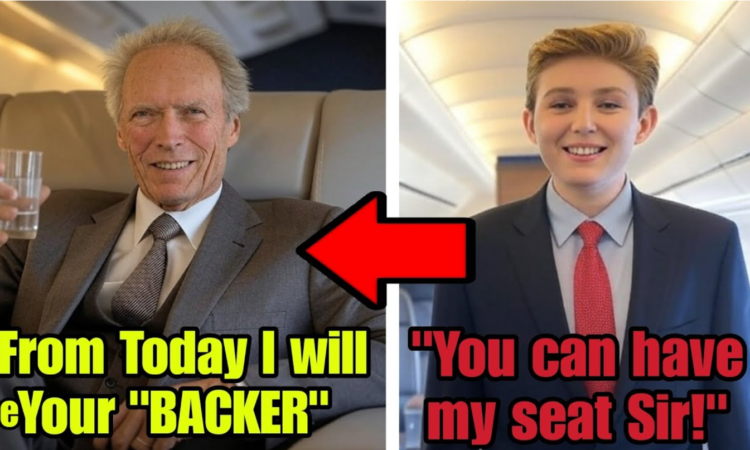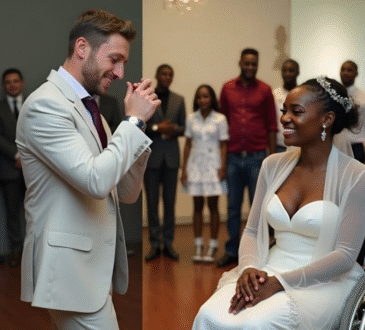Barron Trump Gives Up First Class Seat For Clint Eastwood, Then The Unbelievable Happens!

The hum inside the airplane was like any other—businessmen adjusting their ties, parents juggling snacks and strollers, and the soft hush of luxury settling over first class. But among the mix of everyday travelers was someone quietly recognizable: 17-year-old Barron Trump, the tall and reserved youngest son of former President Donald Trump. He had taken his seat by the window, calmly scanning the in-flight menu, unaware that a moment was about to unfold—one that would change both his life and that of a Hollywood legend.
A sudden stir swept through the cabin. Whispered voices, curious eyes, and then the unmistakable presence of Clint Eastwood, the legendary actor and director, appeared at the front. At over 90 years old, Clint carried decades of cinematic greatness in his every step. But today, there had been a mix-up. First class was overbooked—and Clint had been reassigned to coach.
Without hesitation, Barron stood up and approached him.
“Mr. Eastwood, please take my seat. I insist.”
The plane hushed. Clint studied the young man with those sharp, experienced eyes. “You sure about this, kid?” he asked with a quiet gruffness. But Barron had already gathered his belongings and was making his way to economy.
What began as a simple gesture—a teenager giving up his seat—set off a chain reaction of wonder and admiration among the passengers. Many recognized Barron, but none expected such a quiet, humble act. Flight attendants exchanged glances. Even Clint, a man known for portraying the strongest of heroes, was visibly moved.
Back in coach, Barron squeezed between a chatty salesman and a crying toddler. It was a far cry from the comfort of first class, but he didn’t mind. He popped in his headphones and let the hum of the engine wash over him.
Up front, Clint couldn’t stop thinking about the moment. He pulled out a small notepad, an old habit from his filmmaking days, and began to scribble thoughts. The boy’s gesture had stirred something in him—something he hadn’t felt in years.
Then, the turbulence hit.
The cabin shook violently. Passengers gasped. Overhead bins rattled. Drinks spilled. The pilot’s voice, calm but tense, came over the speaker: “We’re experiencing severe turbulence. Please stay seated.”
In coach, Barron remained calm. Around him, fear took over. In first class, Clint clutched his armrests, his eyes drifting toward the back of the plane. He couldn’t stop thinking about Barron. And for the first time in a long time, Clint felt something deeper than fear—he felt concern.
When the storm passed, Clint rose and made his way down the narrow aisle, stopping at Barron’s row.
“Mind if I sit with you for a bit?”
The two spent the next hour in quiet conversation—an unlikely duo, generations apart, brought together by respect and something far deeper: shared humanity.
“Why’d you give up your seat?” Clint asked.
“It felt like the right thing to do,” Barron replied. “You’ve given so much to the world through your work. I just wanted to give something back.”
Clint was floored. In all his years of storytelling, he had never seen such sincerity in a moment so small.
By the time the plane landed, a few passengers clapped. Then more. The applause grew louder. Someone had posted the story online—and it went viral. The headline? “Barron Trump Gives Up First-Class Seat for Clint Eastwood—Then Sits in Coach During Turbulence.”
The story exploded. Thousands shared it. Millions read it. But it didn’t stop there.
A week later, Clint called Barron. “There’s a film I’ve been meaning to make,” he said. “About kindness. About how one gesture can change everything. I think it’s time. And I want you involved.”
Barron hesitated. “But I’m not an actor.”
Clint chuckled. “You don’t have to be. You’ve already inspired it.”
And so began the creation of “The Power of One,” a movie unlike anything Clint had ever made before. It told five emotional stories—each one sparked by a small act of kindness. One of them, of course, was inspired by Barron’s seat exchange.
They worked side by side—Clint, the seasoned storyteller; Barron, the young heart behind the inspiration. Their bond grew from a creative partnership into a deep friendship. Barron opened up about living in the shadow of fame and wanting to live a purposeful life. Clint shared stories from his youth, filled with grit and triumph.
The film’s premiere was emotional. When the final scene played—a tribute to simple goodness—the audience wept. And then stood.
Clint, always humble, pulled Barron to the stage.
“This young man reminded me why stories matter,” he said. “He’s the reason this film exists.”
From that night on, “The Power of One” became more than a movie. It was a movement. Social media filled with people paying for strangers’ groceries, forgiving old feuds, writing heartfelt letters, and spreading kindness. Schools used the film to teach compassion. Workplaces used it to promote team unity. Charities saw a spike in donations tagged, “Inspired by The Power of One.”
And then the letters came.
One, in particular, struck Barron deeply:
“I was on that flight. I’d lost faith in people. But your kindness gave me hope. It inspired me to reconnect with my estranged son after ten years. Thank you for reminding me of what’s possible.”
Barron showed it to Clint, who smiled and said, “That’s why we made the film, kid. That’s your ripple.”
The journey didn’t stop there. Months later, the film was honored at a global charity gala. Clint surprised Barron by calling him to the stage.
“Kindness isn’t just a choice,” Barron told the crowd, holding the award. “It’s a responsibility. If we all choose kindness, the world changes—one small act at a time.”
And that’s exactly what they kept doing.
One small moment at 35,000 feet.
One selfless act.
One ripple that became a wave.
A wave the world still feels today.




